http://www.imdb.com/title/tt0468569/
– What is Predictive Programming?
– Alan Watt – Predictive Programming; Theory and Practice
– Vyzygoth Interviews Phillip and Paul Collins – Invoking the Beyond (Predictive Programming)
A decent synopsis can be read on the corresponding Wikipedia page.
Police State/Martial Law Scenery
Let’s start with the police state scenery shown in the movie:
 |
 |
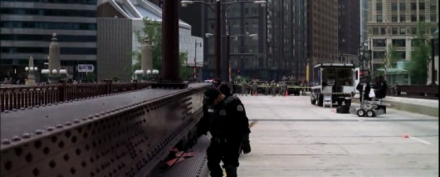 |
 |
Not only do we see quite a substantial presence of police in the movie, we also observe that the military is used as a means of crowd control and the keeping of order. Should reality come to resemble fiction – which is not unlikely, scenes depicting the military fulfilling the role of maintaining civil order helps to prepare the viewer to regard a military presence in urban settings as being normal.
| Ferryboat with Prisoners – Non-Military Guards | Ferryboat with Civilians – Military Guards |
|---|---|
 |
 |
 |
 |
It’s remarkable, to say the least, to observe that the prisoners on one boat are being guarded by civil servants who are relatively light armed and are not geared towards combat and on the other boat the civilians are guarded by regular heavy duty army personnel. Is this more predictive programming that points at a martial law future in which civilians, as a rule, will be policed by the army?
 |
 |
Introducing the Rude and Stoic Strongman Crime Fighter
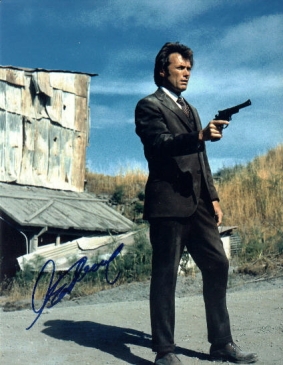 Dirty Harry (Clint Eastwood) |
Batman struck me as a vocal-chords abusing sinister crossing between the equally stoic and grumpy Dirty Harry and the anonymously acting and incorruptible Robocop. By his ultimately noble crime fighting efforts, the character of Batman sort of vindicates the impersonal and rude attitude of law enforcement officers in real life. The message to the viewer being that the stoicism and rudeness displayed by real life crime fighters is a reasonable price to pay for keeping the streets safe.
The tough guy attitude displayed by Batman fits remarkably well in today’s police state crazed mentality; where the public is now all of a sudden seen as a threat and liability rather than something worthy of protection (from the bad guys). In a police state perceptional setting the public has basically become the a priori guilty-until-proven-innocent bad guy and that therefore the cops think themselves of being needy of protection from the presumed ever hostile public. And so harsh preemptive police action against the public is easily vindicated and therefore allowable.
Again, the character of Batman lives up to that police state theme very well.
Indeed, it only takes 20 minutes into the movie before the presence of a Batman is rationalized.

20:00 – Rationalizing the need for a strongman crime fighter
Natasha: I’m talking about the kind of city that idolizes a masked vigilante.
Dent: Gotham City is proud of an ordinary citizen standing up for what’s right.
Natasha: Gotham needs heroes like you, elected officials…not a man who thinks he’s above the law.
Wayne: Exactly. Who appointed the Batman?
Dent: We did. All of us who stood by and let scum take control of our city.
Natasha: But this is a democracy, Harvey.
Dent: When their enemies were at the gates, the Romans would suspend democracy and appoint one man to protect the city. It wasn’t considered an honor, it was considered a public service.
Rachel: Harvey, the last man that they appointed…to protect the republic was named Caesar and he never gave up his power.
Dent: Okay, fine. You either die a hero or you live long enough to see yourself become the villain. lessonbucket.com
Not only is the rise of crime used as an excuse to justify the advent of Batman, if crime were to really rise beyond any acceptable levels, the movie suggests that it would even be justified to “suspend democracy” and so give Batman complete free reign and boundless authority to sweep the streets of Gotham clean.
Thus the idea that alleged unfettered crime proliferation requires draconian crime fighting strategies is forced on the viewer once again.
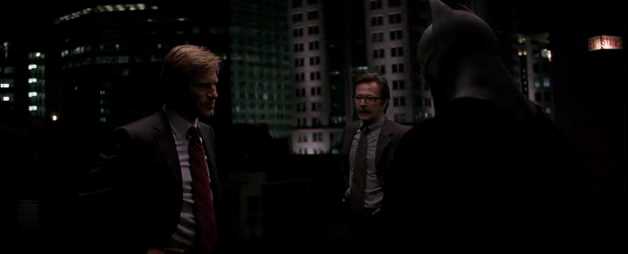
26:00 – District Attorney asks strongman Batman to catch suspected criminal
Dent: We need Lau back…but the Chinese won’t extradite a national under any circumstances.
Batman: If I get him to you, can you get him to talk?
Dent: I’ll get him to sing.
Gordon: We’re going after the Mob’s life savings. Things will get ugly. lessonbucket.com
As such, the alliance between government (Gotham’s District Attorney) and the strongman crime fighter (Batman) is either shown to already exist or informally established on the spot. Either way, this little scene demonstrates that Batman is by no means a vigilante operating on his own accord and discretion.
Consequently, Batman flies over to Hong Kong and in spectacular fashion manages to apprehend and bring back home one of the suspected ring leaders of the organized crime that’s plaguing Gotham. No rendition warrant is needed, no abidance to international law is required, and no stacks of paper work need to be filled in, just one Batman to do the DA’s dirty work is all that is needed thank you very much. In addition, should this act of outsourcing of “extraordinary rendition” go awry and catch a bad press in the process, the contractor will take the fall while the government who hired the contractor can always resort to denying the whole thing (plausible deniability) and so stay in the clear and appear squeaky clean.
So you can imagine that it’s pretty convenient for a government to have a spare “Batman” laying around.
 |
 |
 |
Scenes like these prepare the viewer to accept the notion that extradition of wanted suspected criminals can be enforced and accelerated via resorting to deploy covertly acting extra-governmental services that conveniently bypass all the normal time-consuming legal hassles.
 |
 |
52:00 – Justification of the existence of a strongman crime fighter
Alfred: [Some] men aren’t looking for anything logical, like money. They can’t be bought, bullied, reasoned or negotiated with. Some men just wanna watch the world burn. lessonbucket.com
These words spoken by Batman’s loyal assistant can be interpreted as his perhaps much needed pep-talk. By assisting regular law enforcement, even if covertly, in getting to apprehend the most serious of liabilities to the safety of Gotham, Batman sees his existential rude role vindicated. The motto being: the formidably dangerous Joker must be dealt with by an equally formidably courageous Batman.
As such, the notion that hardened criminals should be dealt with by equally stiff law enforcement, is suggested to the viewer.

55:00 – Batman cast as vigilante
Fox: Let me get this straight. You think that your client…one of the wealthiest, most powerful men in the world is secretly a vigilante who spends his nights beating criminals to a pulp with his bare hands and your plan is to blackmail this person? Good luck. lessonbucket.com
It is interesting to note that Batman is referred to as a vigilante on numerous occasions in the movie. Although Batman may choose to combat crime on his own initiative, this is not always the case as it became apparent earlier on already that he also maintains a secret alliance with Gotham’s DA and police commissioner.
 |
 |
 |
Also the man behind Batman, Bruce Wayne – as is testified by the expensive vehicles and equipment at his disposal – is filthy rich. Therefore it is unlikely, if he really were an independently acting vigilante, that he would also remain unnoticed by the authorities. After all, the purchases of expensive gadgetry are easily traceable by intelligence agencies as are expensive (maintenance) parts. And so a rich vigilante is easily tracked down by the authorities. So much for the philanthropic bad guy catcher acting anonymously towards the authorities. Therefore, it’s much more plausible to assume that Batman represents a covert service or agency that secretly can be contracted by the government to do its “dirty work,” i.e. the kind of work the government cannot be caught doing itself.
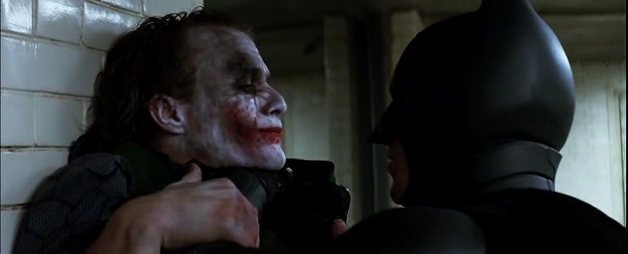
1:20:00 – Batman “interrogates” the Joker
Batman: You wanted me. Here I am.
The Joker: I wanted to see what you’d do. And you didn’t disappoint. You let five people die. Then you let Dent take your place. Even to a guy like me, that’s cold.
Batman: Where’s Dent?
The Joker: Those Mob fools want you gone so they can get back to the way things were. But I know the truth. There’s no going back. You’ve changed things. Forever.
Batman: Then why do you wanna kill me?
The Joker: I don’t wanna kill you. What would I do without you? Go back to ripping off Mob dealers? No, no. No. No, you…you complete me.
Batman: You’re garbage who kills for money.
The Joker: Don’t talk like one of them. You’re not. Even if you’d like to be. To them, you’re just a freak like me. They need you right now…but when they don’t…they’ll cast you out like a leper. You see, their morals, their code…it’s a bad joke. Dropped at the first sign of trouble. They’re only as good as the world allows them to be. I’ll show you. When the chips are down, these…these civilized people they’ll eat each other. See, I’m not a monster. I’m just ahead of the curve. lessonbucket.com
In terms of Hegelian Dialectics, assuming that the Joker is the thesis, or the problem, the obvious anti-thesis, or the reaction, is the Batman. The synthesis, or the solution, is a presumed safer city gained at by a permanently enhanced law enforcement. That is, as the Joker and the Batman fight it out, the city is to transform into a virtual or actual police state.
 |
 |
 |
Immediately following the aforementioned scene, Batman proceeds to “interrogate” the Joker that is but a small step away from downright torture. Batman acts in such a way that his “harsh” interrogation techniques are only a reasonable thing to do since, after all, the Joker has done awfully bad things to his friends Harvey Dent and Rachel Dawes. In addition, the Joker only seems to enjoy as Batman’s fury unleashes on him. Indeed, the Joker proved to have a death wish as he challenged Batman to kill him prior to this scene.
Nonetheless, with respect to predictive programming, the viewer may unfortunately project the screen interpretation onto real life torture events. The viewer may thus rationalize away torture scenes by presuming that the subjects are heinous terrorists who did awful things and that they merely deserve the treatment dished out to them and that they may even be mentally ill to the possible point of suicidality (think also of suicide bombers) and so in their delusion stand to enjoy being subjected to harsh interrogation as they witness their interrogators sweat pearls of anxiety.

1:50:00 – Spying on all civilians to catch one bad guy
Wayne: Beautiful, isn’t it?
Fox: Beautiful. Unethical. Dangerous. You’ve turned every cell phone in Gotham into a microphone.
Wayne: And a high-frequency generator-receiver.
Fox: You took my sonar concept and applied it to every phone in the city. With half the city feeding you sonar, you can image all of Gotham. This is wrong.
Wayne: I’ve gotta find this man, Lucius.
Fox: At what cost?
Wayne: The database is null-key encrypted. It can only be accessed by one person.
Fox: This is too much power for one person.
Wayne: That’s why I gave it to you. Only you can use it.
Fox: Spying on 30 million people isn’t part of my job description.
lessonbucket.com
 |
 |
The utilization of a huge spying network to hunt down merely one man (granted, and his handful of henchmen) is an ominous sign of real life things to come. Indeed, one could ask the question if we already haven’t got to the point of “total information awareness,” i.e. a society in which all of its members are under constant surveillance.
What this movie does of course, is to give the viewer a seemingly reasonable excuse for the government to implement a constant surveillance of its citizens. After all, the viewer is led to believe that in a world filled with dangerous terrorists, the minor inconvenience of being spied on 24-7, is but a small price to pay for keeping the baddies out and so to keep the public safe and sound.

2:18:00 – Justification of the existence of a strongman crime fighter II
Batman: I’m whatever Gotham needs me to be. Call it in.
Gordon (delivering eulogy): A hero. Not the hero we deserved, but the hero we needed. Nothing less than a knight shining.
Gordon: They’ll hunt you.
Batman: You’ll hunt me. You’ll condemn me. Set the dogs on me. Because that’s what needs to happen. Because sometimes the truth isn’t good enough. Sometimes people deserve more. Sometimes people deserve to have their faith rewarded.
James: Batman. Batman! Why’s he running, Dad?
Gordon: Because we have to chase him.
Police Officer: Okay, we’re going in! Go, go! Move!
James: He didn’t do anything wrong.
Gordon: Because he’s the hero Gotham deserves, but not the one it needs right now. So we’ll hunt him…because he can take it. Because he’s not our hero. He’s a silent guardian…a watchful protector. A dark knight. lessonbucket.com
In other words, it’s not important that they are unpopular with the public, Batmans, or strongman crime fighters, are simply essential to help maintain law and order in a troubled society. Any conventional police officers and innocent bystanders who got hurt along the way as the Joker and Batman fought it out, can be shrugged off as unfortunate but insignificant collateral damage; a fair price to pay for restoring or maintaining order in a troubled city. The virtue of the strongman crime fighter sufficiently compensates for his inherent unpopularity with the public.

Credit Where Credit Is Due, RIP Heath Ledger
In spite of its predictive programming elements, it needs to be said that, in my opinion, the movie is a sheer joy to watch. Too bad Heath Ledger died prematurely. He proved to be a most brilliant actor and his interpretation of The Joker is arguably the best role he ever played. Rest in peace, Heath.
 |
 |
What Batman stands for in real life
Batman represents the non-conventional crime fighter, law enforcer and maintainer of civil order. He represents the (extra-)governmental services that track down suspected criminals, or enemies of the state, in an even broader context, even if they are hiding out in countries abroad. Batman’s actions gives a tacit approval of so-called extraordinary rendition programs. He also represents the unpopular and heavily armored martial law kind of police officer that tends to deployed in emergency situations. Batman also justifies the existence of the garden variety of snoop agents or spooks that are spying on the American public 24-7.
Batman’s success in apprehending bad guys, including the biggest bad guy in town, serves to vindicate his rough modes of action and thus gives a huge nod of approval to the aforementioned rich spectrum of unconventional crime fighters and crime preventer.
Batman therefore vindicates the existence of:
Mercenary forces, e.g. Blackwater (Xe Services)
 |
 |
 |
 |
Torture and Extraordinary Rendition Programs
 |
 |
 |
Snoop Agencies
 |
 |
 |
Militarization of Police
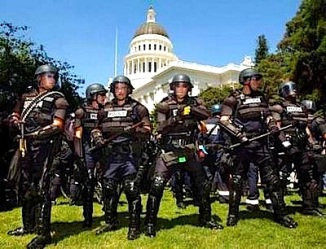 |
 |
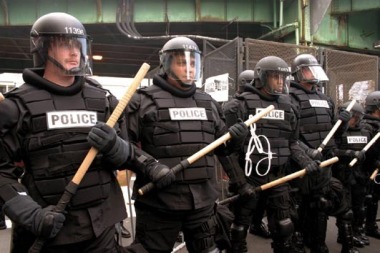 |
Also see my review of Robocop as to how that movie promotes the militarization of police.
My other analyses (oldest first, newest last):
Children of Men (2006)
300 (2006)
28 Weeks Later (2007)
Soylent Green (1973)
Johnny Mnemonic (1995)
The Kingdom (2007)
The Invasion (2007)
Shoot em Up (2007)
John Rambo (2008 )
I, Robot (2004)
Cloverfield (2008 )
Conspiracy Theory (1997)
Starship Troopers 3 – Marauder (2008 )
Indiana Jones and the Kingdom of the Crystal Skull (2008 )
Code 46 (2003)
Equilibrium (2003)
Gattaca (1997)
Minority Report (2002)
V for Vendetta (2005)
Things to Come (1936)
Swordfish (2001)
Independence Day (1996)
Death Race (2008 )
Bee Movie (2007)
The Happening (2008 )
Cyborg Girl – Boku no kanojo wa saib?gu (2008 )
Transformers (2007)
Survivors (2008 ) – BBC TV Series – Part 1of6
Survivors (2008 ) – BBC TV Series – Part 2of6
Survivors (2008 ) – BBC TV Series – Part 3of6
The Day the Earth Stood Still (1951)
The Day the Earth Stood Still (2008 )
I Am Legend (2007)
Robocop (1987) – Promoting the Militarization of Police
Dark Knight (2008) – Excusing the Rude & Stoic Strongman Crime Fighter



